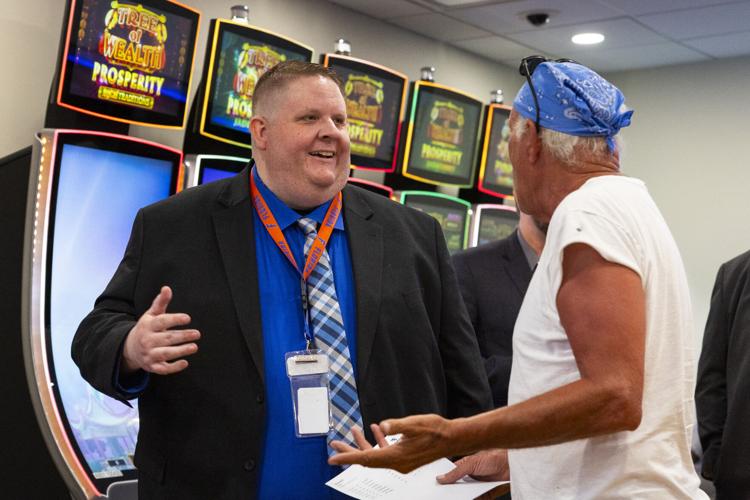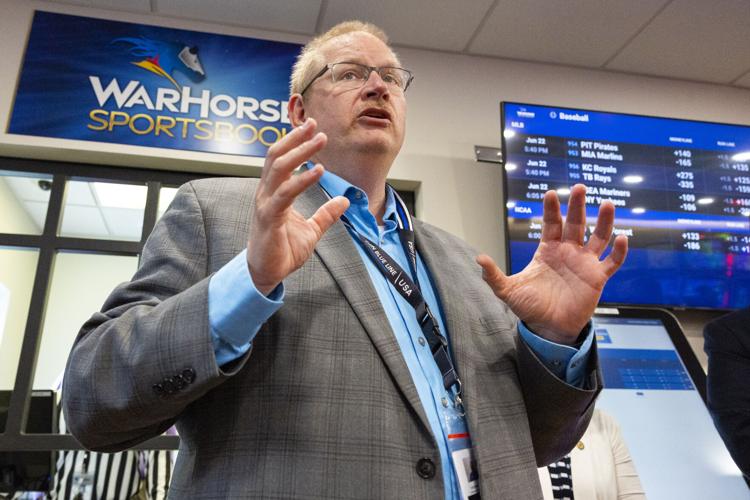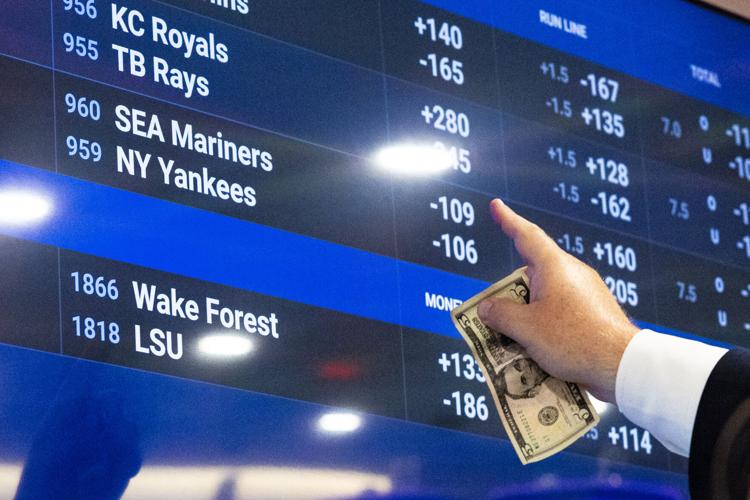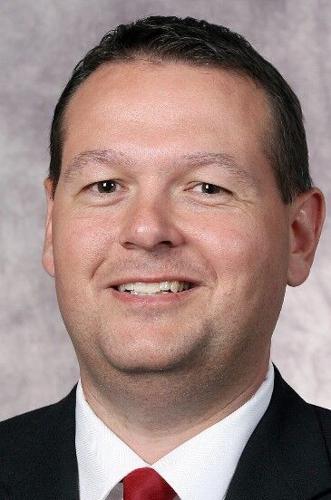It's no longer a matter of if.
Industry experts say the next sports betting investigation — the next scandal — on a college campus is inevitable.
It's more a matter of when. And where.
And that should make every NCAA university athletic department and compliance office — from Gainesville, Florida, to Eugene, Oregon, and all points in between — collectively shudder.
"I would not be surprised at all. I'm actually waiting for it," said Jason Johnston, the sportsbook manager at WarHorse Lincoln. "We're getting into football season, the busiest sports time of the year. My own personal opinion is that we will continue to see these types of circumstances come forward into the public eye for sure."
People are also reading…

WarHorse Casino sportsbook manager Jason Johnston (left) explains the sports betting process to a customer as the first sports wagers are placed June 22.
As the state of Nebraska embarks on its first fall of legalized sports betting, no one appears naïve enough to call the scandal that has unfolded in Iowa in recent weeks either unique or a one-off incident.
"I don't believe it's an isolated issue," Johnston said. "I think there's something bigger at play here. This is just the tip of the iceberg.
"... We've been talking about how big this thing potentially could be."
Tom Sage, the executive director of the Nebraska Racing and Gaming Commission, doesn't disagree, but added that sports betting amongst athletes — either professional or at the collegiate ranks — has always been an issue.
Legalizing sports gambling only brought it to light.
"It's being talked about now because sports betting is legal and is now being regulated," Sage said. "I don't believe it's a new issue. It looks really bad now, but we probably wouldn't know what happened in Iowa had it not been regulated."

Tom Sage, executive director of the Nebraska Racing and Gaming Commission, speaks to patrons as the first sports wagers are placed at WarHorse Casino on June 22.
This summer's findings from sports betting investigations at Iowa and Iowa State universities have sent aftershocks in all directions, including Nebraska, where one of the 15 student-athletes caught in the net transferred into Fred Hoiberg's Husker basketball program.
The investigations, which accuse the 15 student-athletes of tampering with records — including eight who were accused on Thursday of betting on their own teams' games — should send the message that no school should consider itself immune.
If it can happen in Ames, Iowa, a place that like many of the NCAA's more storied campuses, is off the beaten path — far away from the bright lights of Las Vegas or the sway of large metropolises — it can happen anywhere.
That includes Lincoln, where the sports betting landscape has changed dramatically this year. But the University of Nebraska-Lincoln's mode of engagement remains largely the same. It continues to forge ahead by giving its student-athletes the information they need, and then trusting them to make the right decisions.
It regularly educates its teams and student-athletes and staff on NCAA bylaws, which prohibit sports gambling.
Keith Mann, an associate athletic director for Husker Athletics, said each sport has a mandatory preseason compliance meeting and sports gambling is covered in that session.
Mann told the Journal Star the Athletic Department has not had conversations with WarHorse Lincoln and that UNL is not under contract with any integrity monitoring services, opting instead to rely on its own compliance department.

Mann
"Our compliance staff has done some research in this area and viewed a presentation," Mann wrote in an email. "But we don't currently use those services."
The NCAA and Big Ten Conference use such services, while the Nebraska Racing and Gaming Commission receives oversight protection from U.S. Integrity, an agency that works with many state gaming commissions and is paid for by the gaming industry.
Johnston said he appreciates that UNL has taken responsibility in educating its student-athletes because he doesn't have the staff or the time to be on the lookout for them.
"I think it's important for them to communicate the penalties of those that are involved with athletics," he said. "... We're not a resource to micromanage students."
WarHorse Lincoln posts signage on its walls warning that "prohibited participants" — a list of people that include athletes, coaches, officials, trainers or anyone else with "information that is not publicly available" — are not allowed to either place bets or collect winnings on wagers.
Sage also said the Racing and Gaming Commission is implementing a tip line that could yield some reports of fraudulent betting at the sportsbook and in horse racing.
Nebraska has yet to approve online sports betting. Proxy betting is illegal, meaning all bets must be made in person at WarHorse, which provides a regulatory advantage over neighboring states like Iowa and Kansas that allow online bets to be made.
"Brick and mortar is easier to monitor," Sage said. "There is no anonymous betting. You have to come to Lincoln and show your ID before you can make a bet."
Online betting is much more difficult to monitor, Johnston said, and next to impossible to regulate. There are too many opportunities for student-athletes — or anyone — to bypass the safeguards that have been put in place.
What's to stop — to give a hypothetical — a quarterback and his roommate, who's not a student-athlete, from opening an account together in the roommate's name, Johnston asked.
"You place some bets and then we settle up. (He's) not tied to the team. (He's) an adult. How can they come down on that? How could they prove anything? It's very simple for them to do," he said.
Smartphones provide everyone with instant access any time and any day — along with the temptation to test the waters — which makes mobile betting a challenge for those looking for infractions.
And that's likely how the sports gambling scandal unfolded in Iowa.
Iowa launched online sports gambling Jan. 1, 2021, for people 21 and older and its sports gaming is overseen by the Iowa Racing and Gaming Commission, which regularly reviews markets for irregular betting patterns.
The commission found some irregularities and an inquiry was launched in May, which led to the two schools looking into more than 111 people, 26 of whom were student-athletes, and one athletic department employee.
What the investigation initially found was that seven student-athletes — Iowa State quarterback Hunter Dekkers; Paniro Johnson, a sophomore wrestler; and Dodge Sauser, a sophomore offensive lineman; along with former defensive lineman Enyi Uwazurike, now with the Denver Broncos; and Iowa basketball player Ahron Ulis (who has since transferred to UNL); former baseball player Gehrig Christensen; and walk-on kicker Aaron Blom — were charged with tampering with records in an attempt to disguise their identities while placing sports wagers. All are accused of manipulating transactions to create the appearance their bets were placed by other people.
On Thursday, four more football players at each school — Iowa's Arland Bruce IV (who has since transferred to Oklahoma State), safety Reggie Bracy (transferred to Troy), walk-on receiver Jack Johnson, and student manager Owen O'Brien, and Iowa State running back Jirehl Brock, offensive tackle Jake Remsburg, defensive tackle Isaiah Lee and tight end DeShawn Hanika — were charged with tampering with records.
The most recent batch of Iowa players are accused of betting on Hawkeye games during the 2021 and 2022 seasons.
The criminal complaint against Bruce, a junior wide receiver who is the most high-profile player of those accused, alleges he used a DraftKings account under the name of Vincent Bruce — the same account he shared with Bracy — to bet on multiple Iowa games in 2021 and 2022.
The Gazette in Cedar Rapids, Iowa, reported Bruce allegedly made 11 wagers in six games he participated in during the 2021 season and eight wagers on five games that he played in last season.
He is accused of completing 132 bets totaling $4,232. Included in those bets were two "under" bets in 2022 — a 33-13 victory win over Northwestern (the over-under was 37.5 points) and a 21-0 victory over Kentucky in the Music City Bowl (the over-under was 31.5 points). He caught three passes for 27 yards in the victory over the Wildcats but did not participate in the bowl game.
The complaint also shows that he placed bets on the Iowa-Nebraska games in both 2021 and 2022. He had one reception in each of those games.

With $5 in hand, Lincoln City Council member Tom Beckius checks the odds on a screen before placing his bet Thursday at WarHorse Casino. While the state's gambling regulations require bets to be placed on site at the casino, gamblers can use WarHorse's app to build out their wagers, making it easier and faster to place them in person.
The Gazette reported that Ulis, a member of the Husker basketball team since transferring in May, is alleged to have placed "approximately 1,850" sports bets totaling more than $34,800 via FanDuel while using the information of his older brother, Anton Porter.
Ulis is alleged to have placed one wager on a University of Iowa football game and more than 430 bets on NCAA basketball and football events. The complaint does not indicate Ulis placed a bet on a game involving Iowa men's basketball.
According to the complaint, Ulis signed up for FanDuel using Porter's information — such as his birthday — and allegedly placed bets from his personal iPhone while at "his university residence and areas of the university not routinely open to the public."
Johnston said WarHorse Lincoln's maiden voyage into sports betting is being overseen by the Racing and Gaming Commission "to make sure that we have all of our bases covered as best as we can and that we maintain the integrity of college sporting events or really any events."
And while Sage thinks all of the guardrails are in place, it's impossible to know for sure until live rounds — the heavy betting that will come with the start of a new football season on Aug. 31 — are fired.
"We're going through this ourselves for the first time," he said. "We think we have all the safeguards in place, but there are some things we may have to revisit as we go through this."
Nevada-based U.S. Integrity, which was instrumental in shining light on the betting scandal that led to the firing of University of Alabama baseball coach Brian Bohannon in May, provides oversight for a number of state gaming commissions, including Nebraska.
U.S. Integrity focuses its attention on betting line movement, misuse of insider information, notable events in the lives of players and coaches and referee monitoring.
Sage said he has a dashboard on his computer from U.S. Integrity that provides him with real-time information — some relevant, some not — that has the potential to impact the betting on a game or event.
For example, a change to a Major League Baseball umpire for whatever reason, followed by a change in wagering patterns could send up a red flag.
"That would be something to look into," Sage said.
But that's an extreme example of a sports gambling scandal that would draw the attention of an integrity service. Finding student-athletes manipulating the rules is something entirely different, Johnston said.
"There's a lot of investigative work that (integrity services) do, but I feel like they're only privy to the networking and public information that they're aware of," Johnston said.
Small bets made on college campuses from seemingly legitimate accounts would be hard to detect, said Johnston, who questioned whether the Iowa scandal registered with an integrity service while also noting that Iowa State self-reported its violations to the authorities.
"There's a greater good as far as maintaining integrity on point shaving and stuff like that," Johnston said. But as far as student-athletes, he said he feels like it's searching for a needle in a haystack.
The vast majority of sports bets he handles are made legitimately, Johnston said. That means that other than being vigilant regarding big-money bets and the people making them, a casino's hands are tied.
His priority is making sure that those who visit the sportsbook at WarHorse Lincoln, including UNL students of age, have a positive experience.
"I don't want the University of Nebraska students to come in and think they can't visit a casino," he said. "They're 21 or 22. They can make their own decisions. They can go drink in a bar and if they want to come here and experience betting on their favorite sport.
"I don't want to mistreat some person that's going to school at UNL that wants to place a bet on Nebraska when they play Minnesota in a couple of weeks. We want them to be excited about that."
Photos: Sports betting kicks off in Nebraska

Slot machines can be seen in the reflection of an odds board as sports betting kicks off in Nebraska at WarHorse Casino in Lincoln on Thursday.

Gamblers place bets on kiosks at WarHorse Casino in Lincoln on Thursday.

Winnebago Tribal Council Member Kenny Mallory, left, and Vice President of Nebraska Horsemen's Benevolent Protective Association, David Anderson, place the first ceremonial sports bet in Nebraska at WarHorse Casino in Lincoln on Thursday.

Winnebago Tribal Council Member Kenny Mallory, left, and Vice President of Nebraska Horsemen's Benevolent Protective Association, David Anderson, hold up their receipts from placing the first ceremonial sports bet in Nebraska at WarHorse Casino in Lincoln on Thursday.

A gambler uses a kiosk to place a sports bet at WarHorse Casino in Lincoln on Thursday. Bets must be placed in person at one of the kiosks or at the window.

Slot machines can be seen in the reflection of an odds board as sports betting kicks off in Nebraska at WarHorse Casino in Lincoln on Thursday.

Winnebago Tribal Council member Kenny Mallory speaks to the media after placing the first ceremonial sports bet in Nebraska at WarHorse Casino in Lincoln on Thursday. Mallory placed a bet on Wake Forest winning the College World Series.

Winnebago Tribal Council member Kenny Mallory speaks after placing the first ceremonial sports bet in Nebraska at WarHorse Casino in Lincoln on Thursday. Mallory placed a bet on Wake Forest winning the College World Series.

People leave WarHorse Casino as sports betting kicks off in Lincoln on Thursday.
Reporter Chris Dunker contributed to this report.
Reach the writer at 402-473-7391 or psangimino@journalstar.com
On Twitter @psangimino











